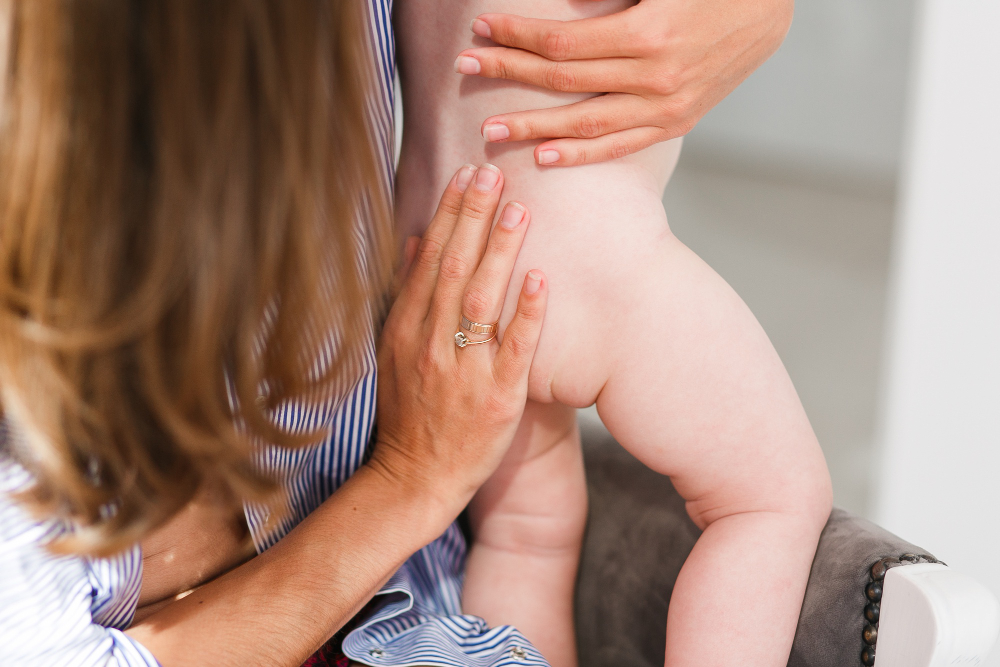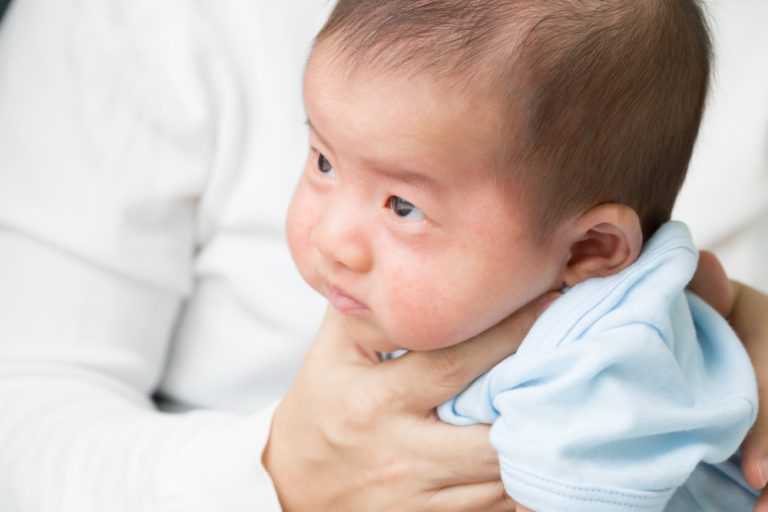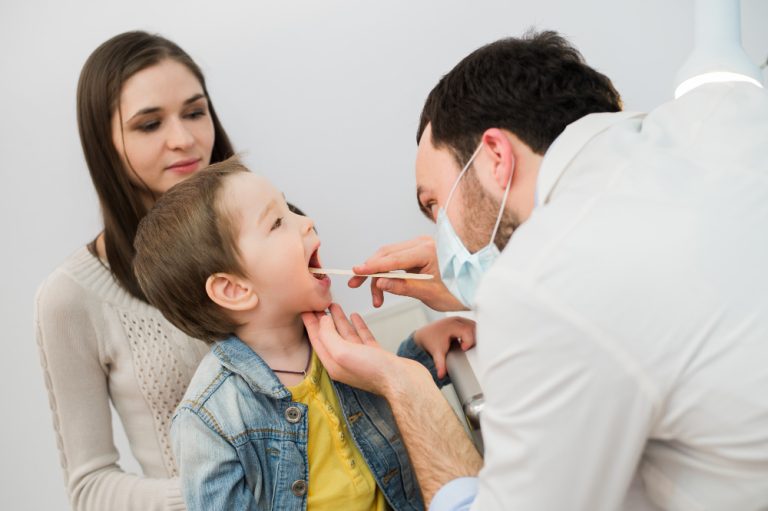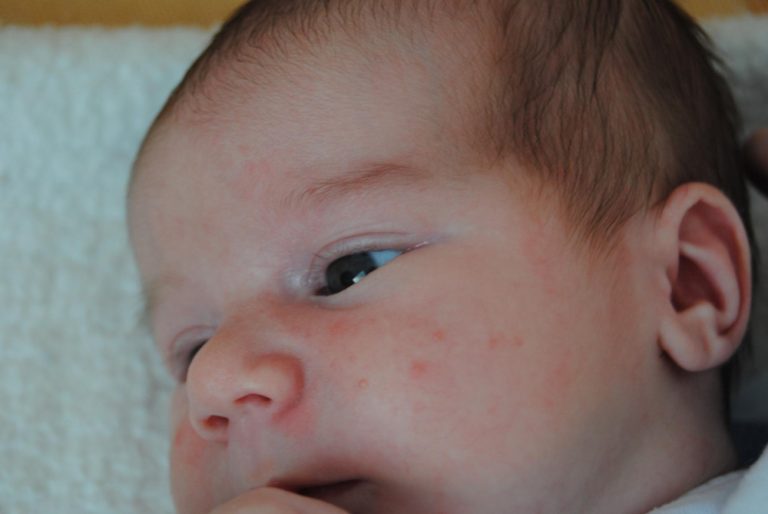How To Treat Ringworm In Babies Naturally? 10 Effective Ways
Are you troubled by the discomfort ringworm is causing your baby’s delicate skin? Dealing with ringworm in babies can be concerning for parents, but fret not! Our blog is here to guide you through how to treat ringworm in babies naturally in a way that is gentle and safe for your little one.
Ringworm, a common fungal infection, can manifest as red, itchy patches on the skin, leading to distress for both you and your baby. So, how can you naturally alleviate these symptoms and ensure your baby’s comfort without harsh chemicals?
In this comprehensive listicle, you will discover a treasure trove of remedies, such as soothing essential oils like tea tree and coconut oil, along with gentle home remedies like apple cider vinegar and aloe vera.
Learn how to treat ringworm in babies naturally, how to manage and mitigate ringworm symptoms in babies effectively, and how to provide relief and care the natural way. Trust our expert advice to nurture your baby’s sensitive skin back to health.
Introduction to Ringworm in Babies
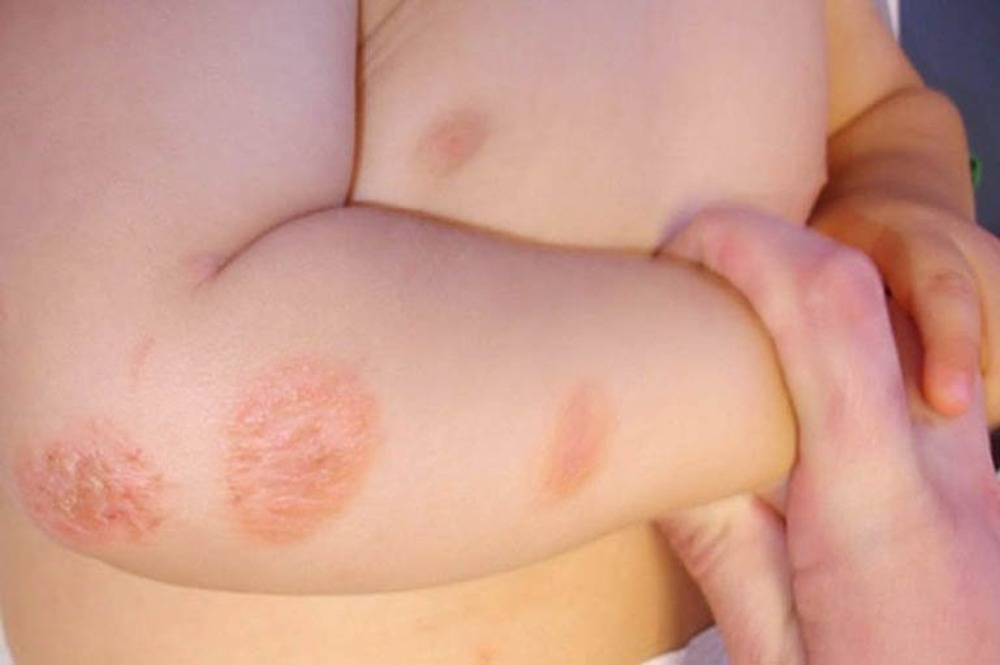
Ringworm is a common fungal infection that can affect babies. Despite its name, ringworm is not caused by worms but by a group of fungi known as dermatophytes. These fungi thrive in warm and moist environments, making babies more susceptible to infection.
Ringworms in babies typically appear as red, scaly patches on the skin that may be itchy and uncomfortable. It can occur on various parts of the body, including the scalp, face, body, and groin area.
Treating ringworm in babies is vital to prevent the infection from spreading and causing further discomfort. However, it’s important to opt for natural remedies that are safe and gentle on their delicate skin. Harsh chemicals commonly found in antifungal creams may cause irritation and adverse effects.
By choosing natural treatment options, you can effectively manage ringworm while minimizing the risk of harm to your baby’s skin.
Remember, always consult with a healthcare professional to confirm the diagnosis and determine the best course of treatment for your baby’s specific situation.
What is Ringworm?
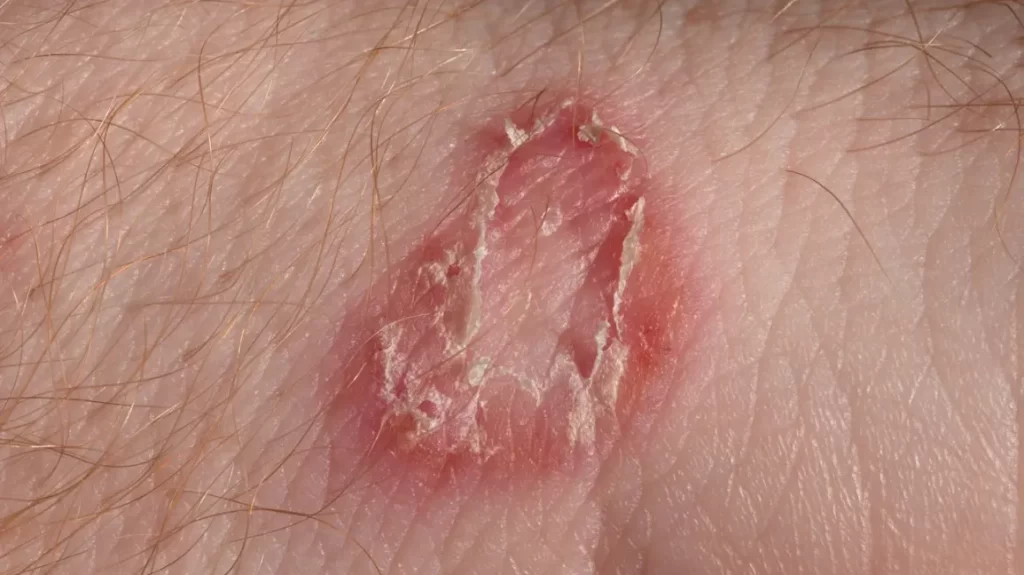
Ringworm, despite its name, is not caused by worms but by a group of fungi known as dermatophytes. It is a common and highly contagious fungal infection that can affect various parts of the body, including the scalp, body, and groin area. The infection causes red, scaly patches on the skin, often with a ring-like appearance. It is important to treat ringworm in babies promptly to prevent the infection from spreading and causing further discomfort.
Signs and Symptoms of Ringworm in Babies
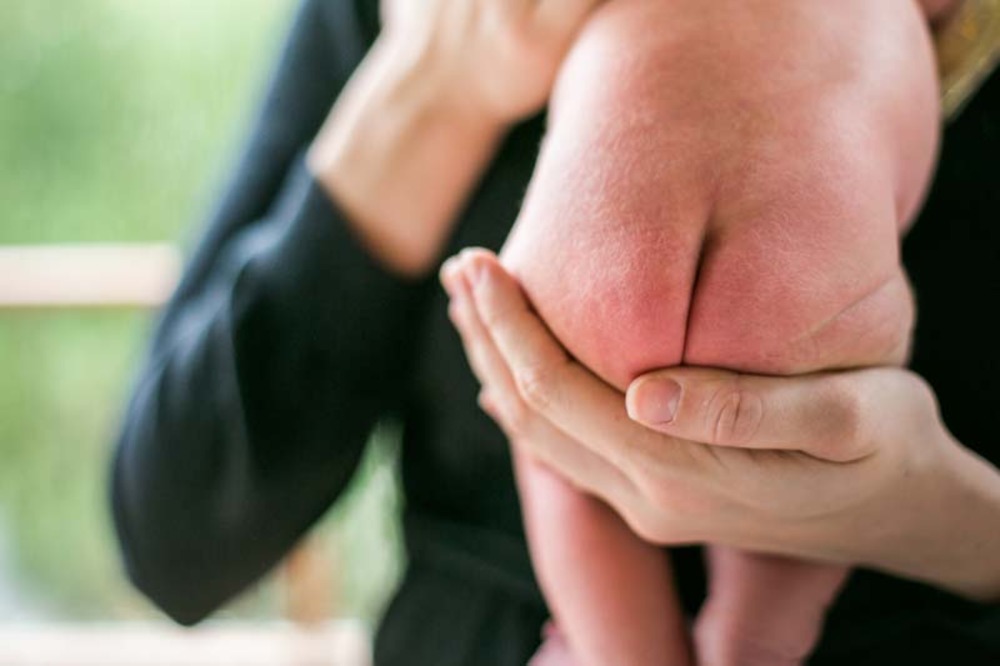
When it comes to identifying ringworm in babies, it’s important to look out for certain signs and symptoms. By recognizing these indications early on, you can take the necessary steps to address the condition and seek appropriate treatment.
Here are the common signs and symptoms to be aware of:
1. Red, Scaly Patches on the Skin
- One of the primary signs of ringworm in babies is the presence of red, scaly patches on the skin.
- These patches may appear inflamed and feel slightly raised to the touch.
- They can occur anywhere on the body, including the scalp, face, arms, or diaper area.
2. Itching and Discomfort
- Babies with ringworm often experience itching and discomfort in the affected areas.
- You may notice your little one scratching, rubbing, or tugging at the patches.
- It’s important to discourage excessive scratching to prevent the spread of the infection and avoid potential skin damage.
3. Circular or Oval Shape
- Ringworm patches usually have a distinct circular or oval shape.
- The outer edges may appear raised and slightly scaly, while the center of the patch may appear clearer or lighter in color.
- This unique appearance is why the name “ringworm” is used, even though it is not caused by worms.
4. Spreading and Multiplying
- If left untreated, ringworm patches can spread and multiply over time.
- Additional patches may develop in nearby areas or even in different parts of the body.
- It’s crucial to address the infection promptly to prevent its progression and minimize discomfort for your baby.
If you notice these signs or suspect that your baby may have ringworm, it’s advisable to consult a healthcare professional for an accurate diagnosis and appropriate treatment. Remember, early intervention can help manage the symptoms and ensure your baby’s well-being.
Diagnosing Ringworm in Babies
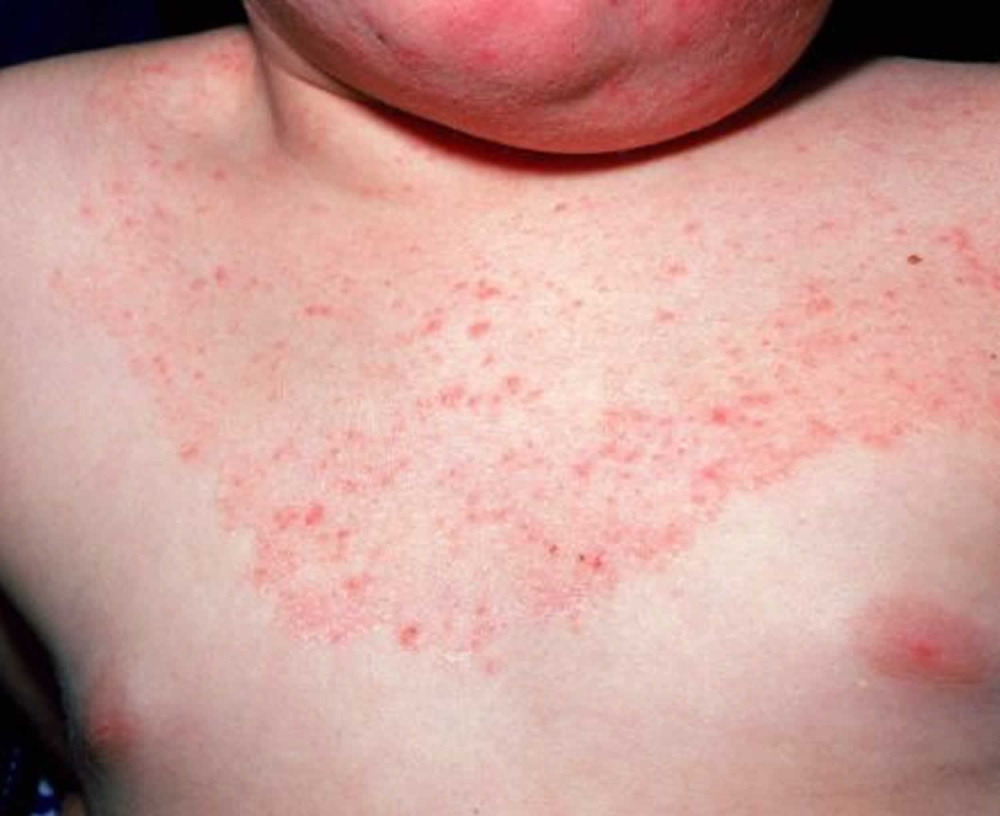
Diagnosing ringworm in babies involves a combination of visual inspection and, in some cases, a microscopic examination. A healthcare provider will carefully examine the affected area, looking for characteristic signs of ringworm. These signs may include red, scaly patches on the skin, itching, and discomfort.
The healthcare provider may also use a special tool called a Wood lamp to examine the area under ultraviolet light. In certain situations, a sample of the affected skin may be collected and examined under a microscope to confirm the presence of the fungal infection. It is important to consult a healthcare provider for an accurate diagnosis and appropriate treatment.
How To Treat Ringworm In Babies Naturally

Ringworm can be a distressing skin condition for babies, but there are gentle and effective natural remedies that can help alleviate the symptoms and promote healing. It’s important to note that these remedies should only be used after consulting with a healthcare provider and ensuring that your baby doesn’t have any allergies or sensitivities.
Here are 10 natural remedies that can be used to treat ringworm in babies:
1. Tea Tree Oil
- Tea tree oil has powerful antifungal properties that can help combat ringworm.
- Mix a few drops of tea tree oil with a carrier oil, such as coconut oil, and apply it to the affected area using a cotton ball.
2. Coconut Oil
- Coconut oil contains lauric acid, which has antifungal properties.
- Apply a thin layer of coconut oil to the affected area several times a day.
3. Apple Cider Vinegar
- Apple cider vinegar has antimicrobial and antifungal properties.
- Mix equal parts of apple cider vinegar and water, and apply the solution to the affected area using a clean cotton ball.
4. Aloe Vera
- Aloe vera gel has soothing properties that can help relieve itching and discomfort.
- Apply a thin layer of fresh aloe vera gel to the affected area.
5. Grapefruit Seed Extract
- Grapefruit seed extract has antimicrobial properties that can help kill fungi.
- Dilute a few drops of grapefruit seed extract in water and apply it to the affected area using a clean cotton ball.
6. Garlic
- Garlic has natural antifungal properties.
- Crush a garlic clove and mix it with carrier oil to create a paste.
- Apply the paste to the affected area and cover it with a clean cloth.
7. Calendula
- Calendula has anti-inflammatory and antifungal properties.
- Make a calendula tea by steeping dried calendula flowers in hot water.
- Allow it to cool, then apply the tea to the affected area using a clean cotton ball.
8. Turmeric
- Turmeric has antifungal and anti-inflammatory properties.
- Mix turmeric powder with water to create a paste, then apply it to the affected area.
- Cover it with a clean cloth and leave it on for a few hours before rinsing off.
9. Neem Oil
- Neem oil has antifungal properties and can help reduce itching.
- Dilute neem oil with a carrier oil and apply it to the affected area.
10. Oatmeal Bath
- An oatmeal bath can help soothe irritated skin.
- Grind oatmeal into a fine powder and add it to warm bathwater.
- Let your baby soak in the oatmeal-infused water for 10-15 minutes.
Remember to monitor your baby’s skin for any adverse reactions and discontinue use if necessary. While these natural remedies can help alleviate the symptoms of ringworm in babies, it’s important to consult with a healthcare provider for a proper diagnosis and guidance on treatment.
Gentle Cleaning and Hygiene Practices
When it comes to treating ringworm in babies, proper cleaning and hygiene practices play a crucial role in preventing the spread of the infection and promoting healing.
Here are some important tips to follow:
1. Keep the Affected Area Clean and Dry
- Regularly clean the affected area with mild soap and warm water.
- Gently pat the area dry with a clean towel, making sure to avoid rubbing or irritating the skin.
- Keeping the area clean and dry helps inhibit the growth of the fungus, which causes ringworms.
2. Use Gentle Cleansers
- Opt for gentle cleansers specifically formulated for babies with sensitive skin.
- Look for fragrance-free, hypoallergenic products and free from harsh chemicals.
- Avoid using harsh soaps or cleansers that can further irritate your baby’s delicate skin.
3. Avoid Irritants
- Be mindful of potential irritants that can worsen the condition or cause discomfort to your baby.
- Avoid using perfumed lotions, powders, or oils in the affected area, as these can irritate the skin and potentially worsen the infection.
- Stick to gentle and natural skincare products.
4. Trim Your Baby’s Nails
- Keeping your baby’s nails trimmed reduces the risk of scratching the affected area and spreading the infection.
- Long nails can inadvertently cause breaks in the skin, allowing the fungus to enter and worsen the condition.
5. Wash and Sanitize Personal Items
- Wash and sanitize regularly items that come into contact with the affected area, such as towels, bedding, clothing, and toys.
- Use hot water and a disinfectant to eliminate any potential fungal spores, preventing reinfection.
6. Avoid Sharing Personal Items
- To prevent spreading the infection to others or other parts of your baby’s body, avoid sharing personal items such as towels, brushes, or clothing.
- Make sure each family member has their own set of personal items to minimize the risk of transmission.
Remember, maintaining proper hygiene practices is essential not only for treating ringworm in babies but also for preventing its recurrence. By incorporating these gentle cleaning and hygiene practices into your daily routine, you can help your baby recover and promote a healthy environment for their delicate skin.
When to Seek Medical Advice
It is important to closely monitor your baby’s condition if they have ringworm. While many cases of ringworm can be effectively treated at home with natural remedies, there are situations where medical advice should be sought. If you notice any of the following, it is recommended to consult a healthcare provider:
1. Severe or persistent symptoms
If the ringworm symptoms worsen or do not show any signs of improvement after using home remedies for a few days, medical advice should be sought.
2. Worsening condition
If the affected area becomes increasingly red, swollen, or painful, or if the ringworm spreads to other parts of the body, it is important to seek medical attention.
3. Concerns about the baby’s general health
If your baby develops a fever, experiences excessive discomfort, or shows signs of a weakened immune system, it is essential to consult a healthcare provider.
Remember, prompt medical intervention can help prevent complications and ensure the best possible care for your baby.
Prevention Tips for Avoiding Ringworm in Babies
Preventing ringworm in babies is essential to protect their delicate skin from this fungal infection. By following simple precautions, you can reduce the risk of ringworm transmission and keep your baby healthy. Here are some effective prevention tips to consider:
1. Maintain Good Hygiene Practices
- Wash your hands thoroughly with soap and water before and after handling your baby.
- Clean and disinfect any surfaces or objects that your baby frequently comes into contact with.
- Ensure your baby’s bedding, clothing, and toys are regularly washed and cleaned.
2. Avoid Contact with Infected Individuals or Pets
- If someone in your household has ringworm, take necessary precautions to prevent the spread to your baby.
- Avoid direct contact with pets that have ringworm or unknown skin conditions until treated.
3. Keep the Baby’s Environment Clean
- Regularly clean and vacuum your home, paying attention to pet bedding, carpets, and upholstery.
- Avoid sharing personal items such as towels, combs, or brushes with others.
4. Promote Dry and Clean Skin
- After bathing, make sure to dry your baby’s skin thoroughly, especially in skin folds and creases.
- Avoid excess moisture on the skin by using gentle, absorbent fabrics for clothing and diapers.
5. Educate Caregivers and Family Members
- Inform and educate all caregivers and family members about the importance of good hygiene practices and ringworm prevention.
By following these preventive measures, you can minimize the risk of ringworm in your baby and promote a healthy environment. Remember to consult a healthcare provider if you suspect your baby has been exposed to ringworm or shows any signs of infection. Taking early action is crucial for effective treatment.
The Final Note: How To Treat Ringworm In Babies Naturally
In conclusion, when it comes to how to treat ringworm in babies naturally, opting for natural and gentle remedies is the best approach. By avoiding harsh chemicals, you can provide relief to your little one’s sensitive skin while effectively managing the symptoms of ringworm.
Throughout this article, we have explored various natural home remedies that are safe and beneficial for treating ringworm in babies. From essential oils like tea tree oil and coconut oil to apple cider vinegar and aloe vera, these remedies have proven to be effective in combating fungal infection.
Proper hygiene practices, such as keeping the affected area clean and dry, using gentle cleansers, and avoiding irritants, are important to prioritize. These practices help prevent further irritation and promote healing.
If the symptoms persist or worsen, it is advisable to consult a healthcare provider. They will be able to provide appropriate guidance and treatment options for your baby’s specific condition.
By following preventive measures, such as maintaining good hygiene, avoiding contact with infected individuals or pets, and keeping the baby’s environment clean, you can reduce the risk of ringworm in babies.
Remember, natural remedies can take time to show results, so consistency and patience are key. With proper care and attention, you can help your baby overcome ringworm while ensuring their delicate skin stays protected.
FAQs: How To Treat Ringworm In Babies Naturally
Here are some frequently asked questions about treating ringworm in babies naturally:
Remember, it is crucial to closely monitor the baby’s condition and consult with a healthcare provider if the symptoms worsen or do not improve with natural remedies.

